Tough Topics to Discuss
- Tough Topics
- Abortion
- Abuse/Incest
- Abusive Relationships
- Acne/Skincare
- Addiction/Sobriety
- Alcohol and Alcoholism
- Anxiety/Phobia
- Body Changes/Body Image
- Bullying
- Cutting/Self Harm
- Death and Grief
- Depression
- Bipolar Disorder
- Divorce
- Drugs
- Eating Disorders
- Food Insecurity
- Health and Hygiene
- Body Self Care
- Homelessness
- LGBTQ+
- Pregnancy
- PTSD in Veterans
- Rape/Sexual Assault Trauma
- Relationships
- Sex
- Sexually Transmitted Diseases (STDs)
- Stress Management
- Suicide
- Undocumented Status/Immigration
Speak to a counselor
Need to speak with someone?
Email personalcounseling@raritanval.edu for an appointment.
Helpful Resources:
-
The Trevor Project's Get HelpResources are available via chat, call, or text. "Connect to a crisis counselor 24/7, 365 days a year, from anywhere in the U.S. It is 100% confidential, and 100% free." Text START to 678678. See additional information by clicking "see more""No Professional Advice
The counseling made available through our Crisis Services cannot replace or substitute for the services of trained professionals in any field, including medical or legal matters. YOUR USE OF OUR CRISIS SERVICES DOES NOT CONSTITUTE MENTAL HEALTHCARE OR TREATMENT AND DOES NOT CONSTITUTE A THERAPIST-PATIENT RELATIONSHIP OR ANY SIMILAR PRIVILEGED RELATIONSHIP. OUR CRISIS SERVICES ARE NOT A SUBSTITUTE FOR PROFESSIONAL HEALTHCARE, MENTAL HEALTHCARE TREATMENT, PSYCHIATRIC CARE, OR THERAPY OF ANY KIND. We do not assume any liability for any direct, indirect, consequential, special, exemplary, or other damages that may result from your use of our Crisis Services, including economic loss, injury, illness, or death.
Our Crisis Services are not intended for anyone in need of immediate medical services or in the case of a life-threatening emergency. IF YOU BELIEVE YOU ARE EXPERIENCING A MEDICAL EMERGENCY, CALL YOUR DOCTOR OR 911 IMMEDIATELY, OR VISIT THE NEAREST HOSPITAL EMERGENCY ROOM.
Risk of Using the Services
You assume all risk for your use of our Crisis Services. Neither The Trevor Project nor any of our employees, volunteers, or agents will be or is responsible for any decisions, or results of the decisions that you make while, as a result of, or after contacting us. This includes whether you choose to seek or not seek professional care, or to modify or terminate specific treatment that you are currently receiving based on the information provided by our Crisis Services."
Ebooks available to read online:
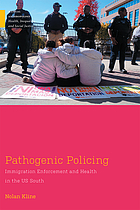
Pathogenic Policing: Immigration Enforcement and Health in the US South
The author focuses on the hidden, health-related impacts of immigrant policing to examine the role of policy in shaping health inequality in the U.S., and responds to fundamental questions regarding biopolitics, especially how policy can reinforce 'race' as a vehicle of social division. He argues that immigration enforcement policy results in a shadow medical system, shapes immigrants' health and interpersonal relationships, and has health-related impacts that extend beyond immigrants to affect health providers, immigrant rights groups, hospitals, and the overall health system.
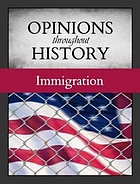
Opinions Throughout History: Immigration
This volume tracks the changing national views on immigration. Historian at-large Micah Issitt traces the path of public opinion and policy on immigration in American history, with each chapter providing insightful commentary on a selected primary source. Drawing from the popular press, key court and legislative battles, speeches, social activism and opinion polls, Opinions Throughout History-Immigration offers readers mixed sources of information woven together to highlight the overall momentum of developing public opinion on this perennial policy issue.
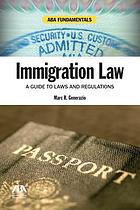
Immigration Law: A guide to laws and regulations
A comprehensive guide to the complex United States immigration system, ABA Fundamentals'' Immigration Law: A Guide to Laws and Regulations is the essential book for lawyers working in the immigration field, people applying for immigration benefits, students studying U.S. immigration laws, corporate counselors, police officers, and community groups.
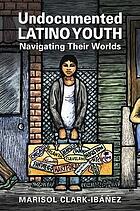
Undocumented Latino Youth: Navigating their worlds
Published in 2015 - Nearly 1.8 million undocumented immigrants are under the age of 18. How do immigration policies shape the lives of these young people? How do local and state laws that are seemingly unrelated to undocumented communities negatively affect them? Marisol Clark-Ibáñez delivers an intimate look at growing up as an undocumented Latino immigrant, analyzing the social and legal dynamics that shape everyday life in and out of school.
Books available at Evelyn S. Field Library
Books on immigration can be found in the library collection upstairs in the following sections:
E184.M5 This sections focuses on immigration to the U.S. from Mexico.
JV6450 This section focuses on the history and current status of immigration in the U.S.
JV6465 This section focuses on the sociological view of
JV6475 This section focuses on stories of immigrants and challenges they face.
JV6600 This section focuses on the psychological aspect of an
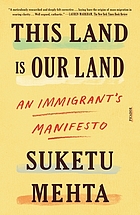
This Land Is Our Land: an immigrant's manifesto
In this book, the author draws from his own experience as an Indian-born teenager growing up in New York City and from years of reporting around the globe. As he explains, the West is being destroyed not by immigrants but by fear of immigrants. Ranging from Dubai and Morocco to New York City, the author contrasts the phony narratives of populist ideologues with the ordinary heroism of laborers, domestic workers, and others, and he takes readers on a heartbreaking trip to San Diego and Tijuana, where a border fence divides families and damages lives.
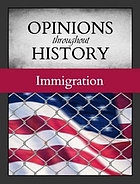
Opinions Throughout History: Immigration
This volume tracks the changing national views on immigration. Historian at-large Micah Issitt traces the path of public opinion and policy on immigration in American history, with each chapter providing insightful commentary on a selected primary source. Drawing from the popular press, key court and legislative battles, speeches, social activism and opinion polls, Opinions Throughout History-Immigration offers readers mixed sources of information woven together to highlight the overall momentum of developing public opinion on this perennial policy issue.
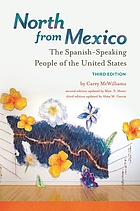
North From Mexico: the Spanish speaking people of the United States
This book provides students, educators, and politicians with an update to the classic Carey McWilliams work North From Mexico. It provides up-to-date information on the Chicano experience and the emergent social dynamics in the United States as a result of Mexican immigration. It provides readers with an in-depth understanding of the changing demographics of the Mexican immigrant population in the United States and it analyzes the major trends in U.S. immigration, including anti-immigrant policies, issues facing the unauthorized immigrant population, and the development of the immigrant rights movement.
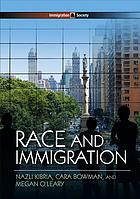
Race and Immigration
This book discusses immigration and its part in shaping the racial landscape of the U.S. today. It emphasizes the dynamic and mutually formative interactions of race and immigration. Drawing on a wide range of studies, it explores key aspects of the immigrant experience, such as the history of immigration laws, the formation of immigrant occupational niches, and the development of immigrant identity and community. Specific topics covered include: the perceived crisis of unauthorized immigration; the growth of an immigrant rights movement; the role of immigrant labor in the elder care industry; the racial strategies of professional immigrants; and the formation of pan-ethnic Latino identities.

How Race Is Made in America: Immigration, Citizenship and the Historical Power of Racial Scripts
This book examines Mexican Americans―from 1924, when American law drastically reduced immigration into the United States, to 1965, when many quotas were abolished―to understand how broad themes of race and citizenship are constructed. These years shaped the emergence of what the author describes as an immigration regime, which defined the racial categories that continue to influence perceptions in the United States about Mexican Americans, race, and ethnicity. Molina introduces and explains her central theory, racial scripts, which highlights the ways in which the lives of racialized groups are linked across time and space and thereby affect one another.
- Last Updated: Jan 30, 2025 12:40 PM
- URL: https://library.raritanval.edu/toughtopics
- Print Page
